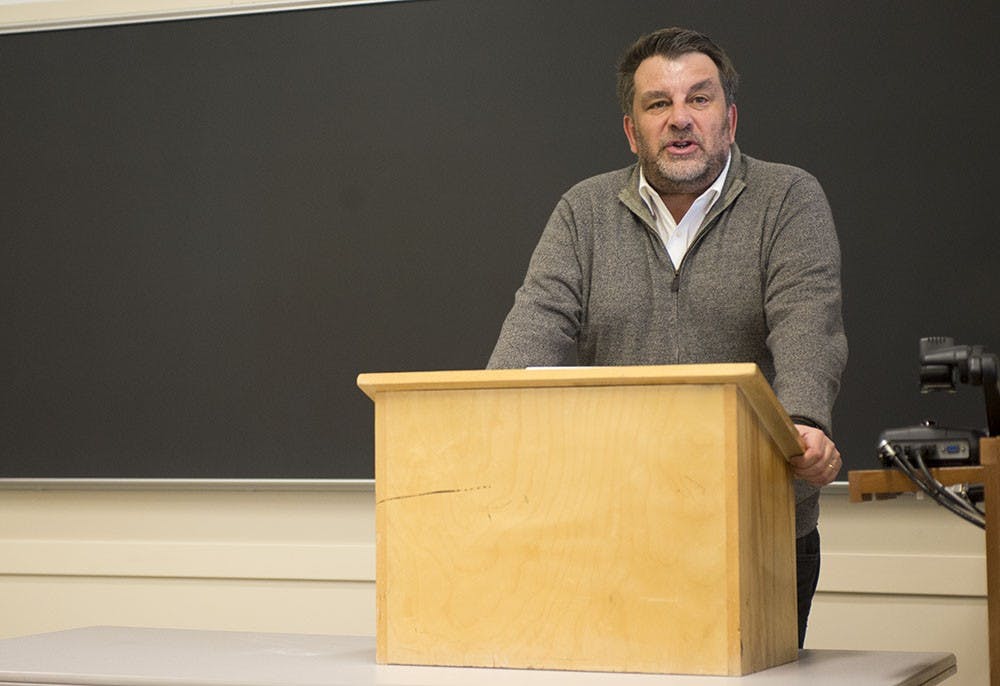The French department hosted a discussion Friday on the recent terrorist attacks in France featuring visiting lecturer Vincent Michelot. Titled “Je Suis Charlie: A Rorschach Test of the Republican Compact,” the talk attracted roughly 55 attendees and focused on the Charlie Hebdo attacks, its causes and implications.
Michelot currently serves as the Director of Sciences Po Lyon, a French university which specializes in sociopolitical sciences and international relations. Michelot was also a Fulbright Scholar at the University and has lectured at both Amherst College and Brown University.
Assoc. French Prof. Janet Horne organized the event. She has worked previously with Michelot in developing the University’s program in Lyon and said picking the lecture subject was easy because of the political and social causes and implications.
Horne said Michelot’s lecture was more reflective than reactionary, in part because of the time passed since the attacks.
“[Michelot has] had time to think about it more in terms of not so much as the events themselves, but what they mean looking forward for France and what are the main challenges facing France today, how do they maintain their constitutional principles and still address much needed social and cultural reform,” Horne said.
In his talk, Michelot spoke about the current sociopolitical situation in France and drew comparisons between the Charlie Hebdo attacks and the Sept. 11, 2001, attacks on the United States. He also noted the changes in the relationship between the two countries in light of terrorist attacks.
“In France, we were all Americans [after 9/11],” Michelot said. “[But] the minute the President of the United States [Bush] uttered the word ‘crusade,’ it was the end of any kind of solidarity between the two republics.”
Addressing the contrast he believes France offers, Michelot gave an altered version of France’s motto, “liberté, égalité, fraternité” — “liberty, equality, fraternity” — by adding “laïcité,” a French word with connotations of secularism and the separation of Church and state.
“We tend to define freedom to a very large degree as the absence of religion from the public sphere,” Michelot said. “We are free because we do not have religion in the public sphere, but that means that one has to guarantee that religion is [wholly separate] from the public sphere, and who else can guarantee that the church is absolute from the public sphere but the government?”
Michelot also discussed how France’s efforts to maximize equality and freedom of expression have ironically led to less cultural acceptance and sensitivity. Because France has been so adamant about freedom of expression, he said, the press has much more ability to be blasphemous in their publications.=
“Equality in France is an inability to recognize differences,” Michelot said. “By leading the crackdown on freedom of speech and freedom of religion, we brought Charlie upon ourselves.”
Michelot said it is important for students to understand the Charlie Hebdo attacks because they resonated so deeply with the younger generation in France.
“Freedom of press does not mean the same thing to a person who is 19 and thinks freedom of press should be absolute and someone who is 40 and realizes freedom of press is important, but also realizes someone who harbors these religious feelings may be hurt by a cover of a newspaper that is insulting to the prophet for example,” Michelot said. “It is this kind of approach that is very generational.”
Third-year College student Katherine Krudys said she thought the talk was both relevant and effective in clarifying the French sociopolitical situation.
“I thought it was very interesting because it brought together the problems with equality in the U.S. and in France and the differences that get lost in both literal and cultural translations,” Krudys said.
Overall, Horne said she was pleased with the turnout and the student participation at the event.
“I thought it was great. He came mainly to speak to our students and I wish we had more time for questions,” Horne said. “I was very happy with the attendance and [a] large majority of people in the room [was] students.”







